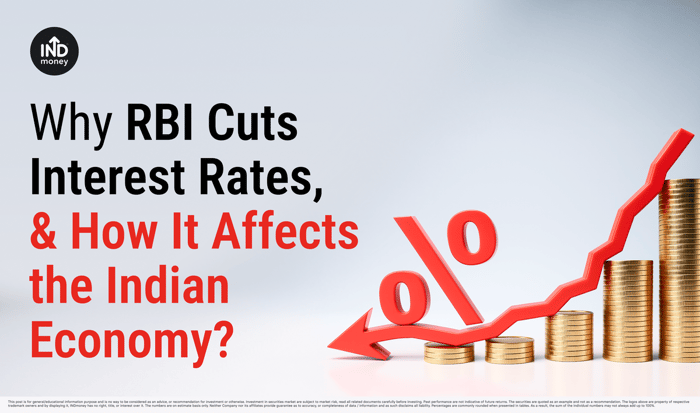
- What Is the Repo Rate?
- Why RBI Cuts Rates
- Impact on Individuals
- Impact on Businesses and Jobs
- The Inflation Trade-off
- Impact on Stock Markets
- Why It Matters
- Disclaimer
Why do your FD rates suddenly fall whenever the RBI announces a rate cut? It may feel unfair, but it’s part of how the central bank steers the economy. An interest rate cut doesn’t just change what banks pay you, it ripples through to borrowers, businesses, jobs, stock markets, and even the rupee in your pocket.
This question is especially relevant today. The U.S. Federal Reserve has just cut rates for the first time in 2025. Global investors now expect other central banks, including the RBI, to follow. If the RBI does move, what would it mean for you and the Indian economy?
What Is the Repo Rate?
The RBI’s main lever is the repo rate, the rate at which it lends short-term funds to commercial banks. Think of it as the “price of money” in the economy. If the repo rate falls, banks can borrow more cheaply. In turn, they can reduce lending rates for individuals and companies. This is why repo cuts show up in your home loan EMI or FD return.
Why RBI Cuts Rates
RBI usually cuts rates when growth is slowing but inflation is under control. Lowering borrowing costs makes it easier for households to take loans and for companies to invest. More spending and investment lift demand across the economy. In short, a rate cut is the RBI pressing the accelerator pedal when growth momentum weakens.
Impact on Individuals
This is where the effect feels personal:
- Borrowers win. Lower rates mean lighter EMIs on home, car, and personal loans if banks pass on the cut. Even a small drop can save a family thousands over the life of a loan.
- Savers lose. FD and savings account rates fall, reducing returns. Retirees or conservative savers depending on interest income are hit the hardest.
In simple terms: borrowers smile, savers sigh.
Impact on Businesses and Jobs
Rate cuts ripple through the corporate world too. Lower interest costs encourage firms to borrow for expansion, build factories, and launch projects. This creates jobs and boosts demand in sectors like housing, autos, and consumer goods. The idea is to make money cheaper so economic activity revs up.
The Inflation Trade-off
But cheaper money has a catch. More demand can push prices higher if supply doesn’t keep up. That’s why the RBI won’t cut rates when inflation is already running hot. The central bank’s job is to balance growth and price stability, step on the accelerator without overheating the engine.
Impact on Stock Markets
Stock markets usually cheer rate cuts because they make money cheaper and more plentiful. Companies with high borrowing needs see costs fall, and investors shift from low-yielding deposits into equities in search of better returns. Here’s where the impact shows up the most:
- Banks & NBFCs: Lower borrowing costs encourage credit growth. Big lenders like HDFC Bank, ICICI Bank along with NBFCs such as Bajaj Finance, often benefit from higher loan demand.
- Real Estate & Housing Finance: Cheaper home loans stimulate property demand. Developers like DLF and housing finance companies such as LIC Housing Finance gain from improved affordability.
- Automobiles & Consumer Durables: Lower EMIs boost big-ticket purchases. Companies like Maruti Suzuki, Mahindra & Mahindra, Hero MotoCorp, and consumer firms like Voltas or Whirlpool can see demand lift.
- Infrastructure & Capital Goods: Firms with heavy debt or expansion plans see borrowing costs drop. Players like Larsen & Toubro (L&T) and Adani Enterprises often benefit from cheaper capital.
On the flip side, banks might face short-term margin pressure if deposit rates don’t fall as fast as lending rates. But overall, markets typically view a rate cut as a positive signal for growth and corporate earnings.
Why It Matters
RBI rate cuts aren’t random. They’re deliberate steps to keep growth moving when the economy slows, exactly the kind of policy move that’s now under the spotlight after the Fed’s 2025 rate cut. For individuals, the effect depends on which side you’re on: borrowers benefit from lower EMIs, savers lose out on FD returns. For the economy, it’s a boost that needs careful timing to avoid fuelling inflation.
Disclaimer
Investments in the securities market are subject to market risks, read all the related documents carefully before investing. The securities are quoted as an example and not as a recommendation. This is nowhere to be considered as an advice, recommendation or solicitation of offer to buy or sell or subscribe for securities. INDStocks SIP / Mini Save is a SIP feature that enables Customer(s) to save a fixed amount on a daily basis to invest in Indian Stock. INDstocks Private Limited (formerly known as INDmoney Private Limited) 616, Level 6, Suncity Success Tower, Sector 65, Gurugram, 122005, SEBI Stock Broking Registration No: INZ000305337, Trading and Clearing Member of NSE (90267, M70042) and BSE, BSE StarMF (6779), SEBI Depository Participant Reg. No. IN-DP-690-2022, Depository Participant ID: CDSL 12095500, Research Analyst Registration No. INH000018948 BSE RA Enlistment No. 6428. Refer https://indstocks.com/pricing?type=indian-stocks; https://www.indstocks.com/page/indian-stocks-sip-terms-and-condition for further details.